#Indelible Film Images
Explore tagged Tumblr posts
Text


Marilyn Monroe, born Norma Jeane Mortenson on June 1, 1926, was an American actress, model, and singer who remains an enduring cultural icon. Her life, marked by beauty, talent, and tragedy, continues to fascinate and inspire generations worldwide.
Monroe began her career as a model, rising to prominence in the 1950s as a Hollywood actress. Known for her distinctive blonde hair, captivating smile, and hourglass figure, she quickly became one of the most recognized faces in the entertainment industry. Her roles in films such as "Gentlemen Prefer Blondes" (1953), "The Seven Year Itch" (1955), and "Some Like It Hot" (1959) showcased her comedic talent, charisma, and undeniable screen presence.
Beyond her acting abilities, Monroe captivated audiences with her vulnerability and sensitivity on screen, often portraying characters who masked their insecurities with glamour and allure. Her iconic performance of "Diamonds Are a Girl's Best Friend" in "Gentlemen Prefer Blondes" and her unforgettable subway grate scene in "The Seven Year Itch" have become iconic moments in cinematic history.
Off screen, Monroe's personal life garnered as much attention as her film career. Her marriages to Joe DiMaggio and Arthur Miller, as well as her relationships with other prominent figures, added to her mystique and public fascination. Despite her glamorous image, Monroe faced personal challenges and struggled with her mental health, which contributed to her tragic death in 1962 at the age of 36.
Monroe's legacy transcends her brief life and continues to influence popular culture. Her enduring status as a symbol of beauty, sensuality, and vulnerability has made her an eternal icon. Her timeless photographs by photographers such as Milton H. Greene and Cecil Beaton, as well as her memorable film performances, ensure that Marilyn Monroe remains a cultural phenomenon whose impact resonates to this day.
In conclusion, Marilyn Monroe's legacy as an actress and cultural icon is characterized by her beauty, talent, and complex persona. Her contributions to film and popular culture have left an indelible mark, ensuring that she remains an eternal symbol of Hollywood glamour and enduring allure.
#marilyn monroe#norma jean baker#norma jeane mortenson#40's#50's#vintage#pinup#celebrity#old hollywood#glamour#vintage hollywood#hollywood#pin up girl#pinup model
103 notes
·
View notes
Text
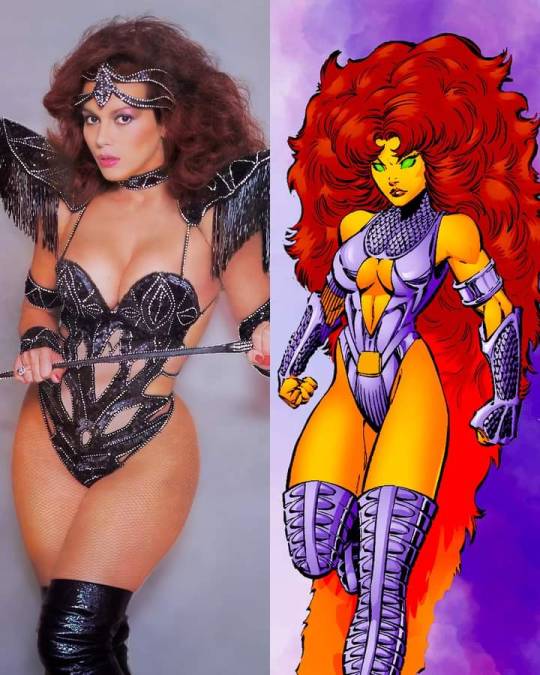
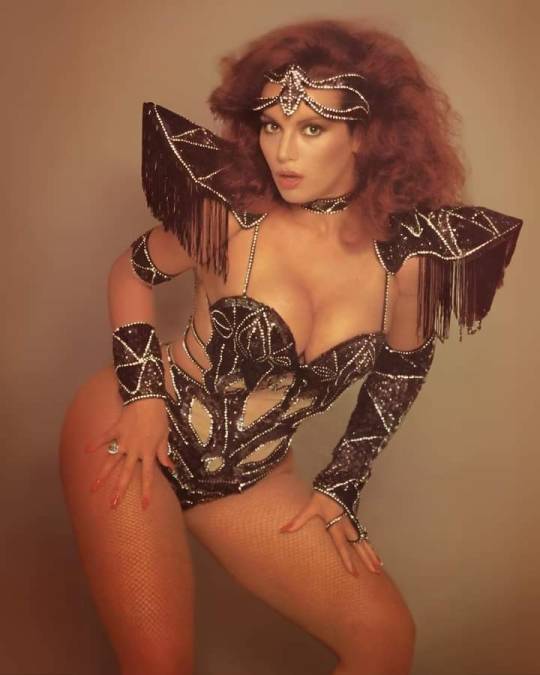

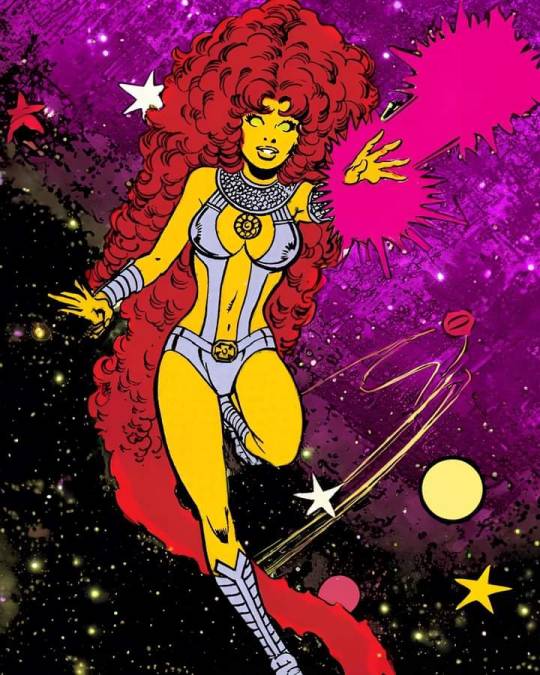
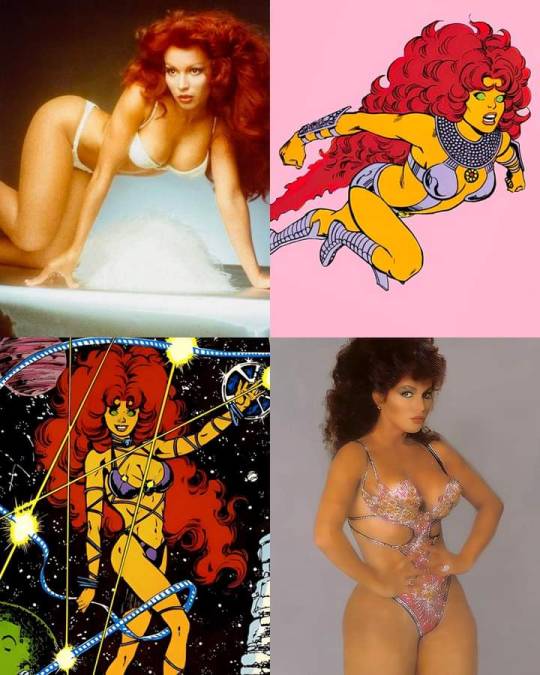
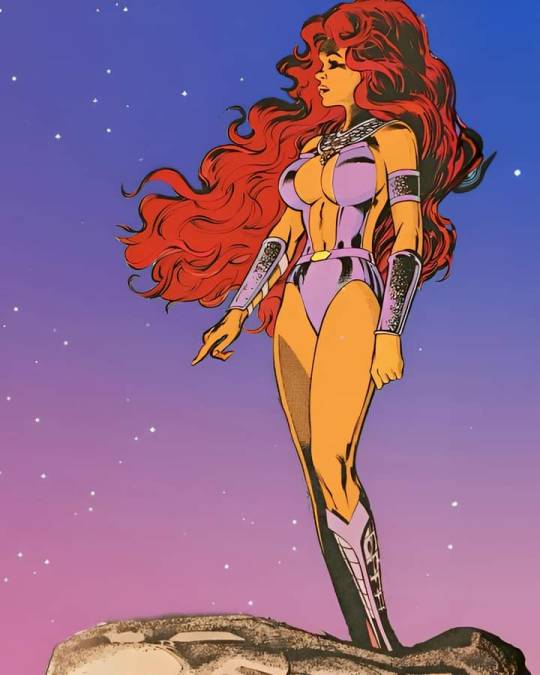

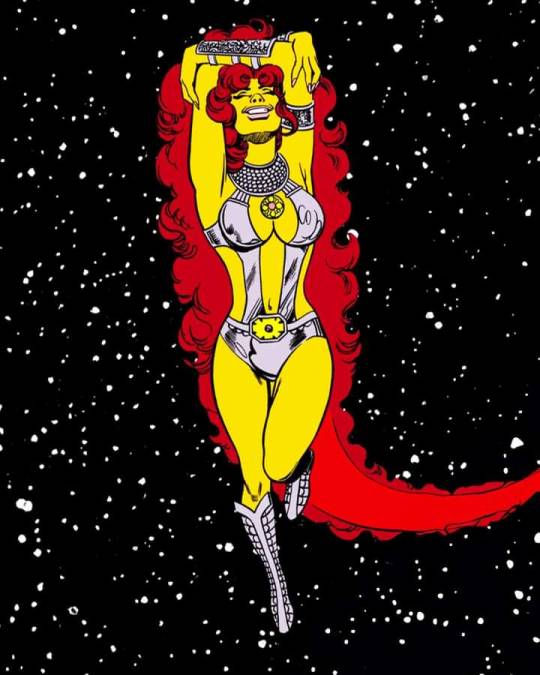
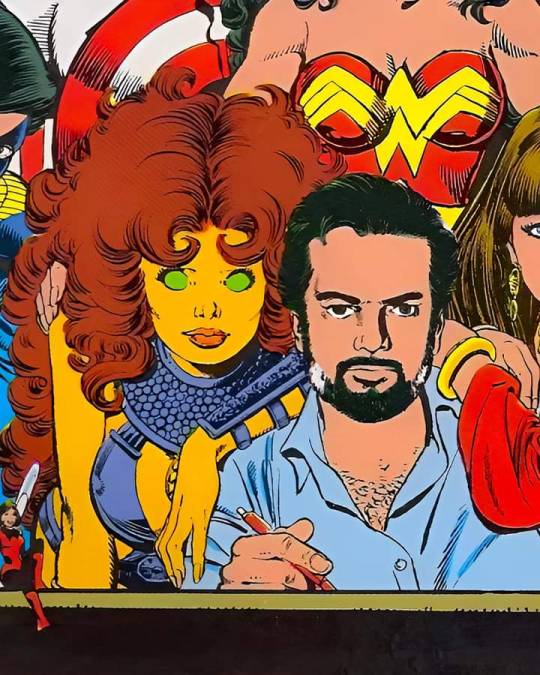
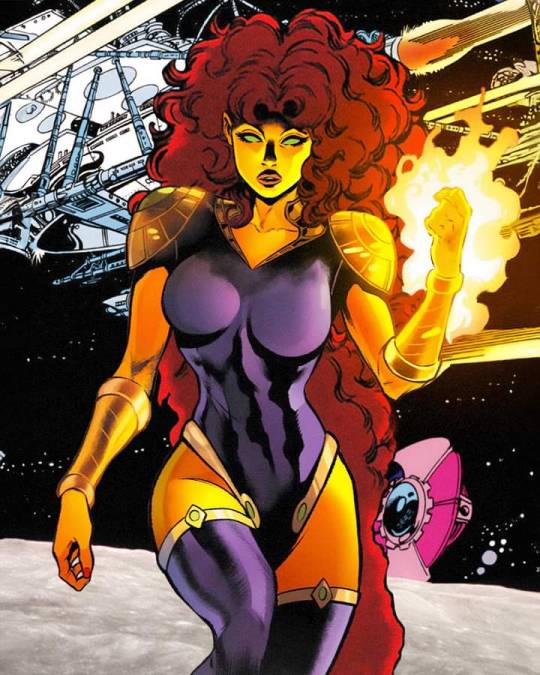
Iris Chacón: The inspiration behind Starfire from the Teen Titans.
In the captivating realm of female iconography, showgirls have left an indelible mark as embodiments of an idealized woman, their allure manifested through an extravagant display of eroticism, and glamour has enraptured artists historically. From sculptors to poets, musicians to designers, showgirls have always served as muses. Even the world of comic art has found inspiration in them, and the idea that Iris Chacón might have influenced the creation of Starfire is a subject of longstanding discussion.
George Perez, Starfire's creator, was undeniably shaped by his Puerto Rican heritage, and Iris Chacón stood as a prominent boricua figure in America. Her influential presence, starting in 1972 with the Iris Chacón Show, coincides in time with George's formative years.
In 1980, Starfire made her memorable debut, captivating readers with her fierce image that bore a striking resemblance to Iris Chacón. While other inspirations like Red Sonja, an older superheroine, and adult film star Rosemary Lorenz were mentioned by Perez, the parallels between the two were undeniable.
As the 80s unfolded, Starfire's appearance gradually mirrored Chacón's, Simultaneously, the showgirl gained considerable notoriety in the US, gracing prominent media outlets, from David Letterman to the front page of the Wall Street Journal.
Throughout the years, speculation regarding Starfire's inspiration persisted, with no concrete evidence to validate the theory. It was not until 2019, during the Amazing Las Vegas Comic Con, that Vu Nguyen, Perez's biographer and superfan (founder of thegeorgeperez.com), had the opportunity to ask him about the origins of Starfire. During this candid exchange, Perez finally acknowledged that Iris Chacon had indeed served as a significant influence in crafting the character. Why wouldn't he have admitted it earlier? Sadly George Perez died a couple of years later, due to complications from pancreatic cancer.
In conclusion: Iris Chacon is indeed the inspiration behind Starfire, reaffirming once again the value of Latina showgirls in the history of female representation and iconography.
332 notes
·
View notes
Text
𝐕𝐈𝐑𝐀𝐋 [𝐈𝐈]



𝐒𝐮𝐦𝐦𝐚𝐫𝐲: days later, you're hung up on what transpired between you and Rafe. Unable to distract yourself, you decide to take matters into your own hands, only for things to take a drastic turn... Maybe having walls as thin as yours is not the blessing you first thought it was.
𝐖𝐚𝐫𝐧𝐢𝐧𝐠(𝐬): pornstar!Rafe Cameron, language, mentions of and descriptions of sex and sexual content, mutual masturbation, oral (m), R is THIRSTY, fingering, overstimulation if you squint, *gasp* and they were neighbours! if I missed anything lmk!
𝐑𝐞𝐜𝐨𝐦𝐦𝐞𝐧𝐝𝐞𝐝 𝐋𝐢𝐬𝐭𝐞𝐧𝐢𝐧𝐠: star boy - the weeknd; good kisser - usher; hands to myself - selena gomez
𝟷𝟾+ 𝙼𝙳𝙽𝙸 - 𝙸 𝙳𝙾 𝙽𝙾𝚃 𝙿𝙴𝚁𝙼𝙸𝚃 𝚁𝙴𝙿𝙾𝚂𝚃𝙸𝙽𝙶 𝙾𝚁 𝚃𝚁𝙰𝙽𝚂𝙻𝙰𝚃𝙸𝙽𝙶 𝙾𝙵 𝙼𝚈 𝚆𝙾𝚁𝙺
Days after your first foray with Rafe in his kitchen, you'd been left in a kind of limbo; too shy to ask for more but thinking of nothing else. Things hadn't seemed to change all that much at a glance, but you could feel it in the way you shared glances across the laundry room. Or how your fingers grazed when he handed your mail over first thing on a Saturday morning.
It was getting unbearable and all you could do was suffer in silence. Well, not total silence. Not in the small hours when your vibrator called to you from your nightstand drawer on more than one occasion. It was beginning to affect every little thing you did. Collecting mail from downstairs had you wishing he'd appear and bend you over the sorting table. Swapping your laundry over in the basement made you want to sit on a machine with his head between your thighs as the washer rumbled and vibrated beneath you.
You had a serious problem.
Even midday naps were no longer sacred. Rafe had managed to leak into every aspect of your life since that night. It was driving you crazy. What else could he do? What was he into? So many more questions like that filled your every waking hour. Bu all you could do whenever you saw him was smile awkwardly and offer a small wave.
So who was going to blame you when you saw him picking up a delivery and he was there in his - now trademark - grey sweatpants and no shirt, gold chain hanging perfectly against his collarbones. He hefted the box into his arms and you had to bite back the moan that threatened to excape at the sight of his biceps flexing.
You'd ducked back into your apartment before you could be seen and later that night, the indelible image of those muscles flexing and rippling took you over the edge of white hot euphoria. You weren't exactly shy either with your volume, uncaring if he heard you or not over the equally explicit sounds coming from his side of the wall.
And now, ten days later, you were still harboring that sinful crush on your neighbour, who may or may not already be in the know. Rafe kept his cards close to his chest, that's for sure. Nothing in his outward demeanour had changed, or so you thought as you passed each other in the corridor or made eye contact as you took out the garbage.
You'd also learned some interesting things about Rafe since that night in his kitchen. For example, if he wasn't filming that day, at about one in the morning you could hear him rubbing one out. That was enough to tell you that he could definitely hear you too. Or, when he was filming you heard almost every single one of his co-stars refer to him as Daddy. Not that you'd argue, to be honest.
It must've been a free day for him because you hadn't heard a peep all morning, save for him moving about in his kitchen, playing music. But almost like clockwork, around the 1 AM mark, the faint, throaty grunts and groans started. Unlike the other times though, you decided to indulge yourself.
Your fingers travelled, skimming along exposed skin and pushing your sleepshorts down to your ankles, underwear quick to follow. You closed your eyes as you began working circles against your clit and teasing at your bare cunt. Picturing Rafe hovering over you, your legs over his shoulders as he rocks into you relentlessly, that fucking gold chain dangling in your face with each thrust.
"Fuck..." you moaned, louder than you had originally intended. Rafe quietened for a moment before resuming at a slightly louder volume than before, as if trying to prove a point. His moans and muffled cursing was enough to keep you going, wanting to make it a game of who could be louder, to hell with anyone else in the unit.
That familiar knot in the pit of your stomach already began tightening with each sinful and illicit noise you could hear from Rafe. Even as you tried your hardest to reach that one spot just inside your aching cunt, knowing it would draw out loud, unfiltered moans from you, you kept picturing Rafe in the room with you, pounding into you like his life depended on it or between your thighs like he had been the other night.
"Rafe - oh, shit -" you gasped as you stroked against that one spot inside you and kept your other fingers pressing messy circles into your clit, making you crave the release that was so close.
Next door, Rafe didn't let up either, clearly trying to egg you on and encourage this.. Whatever it was that you were doing. And it was working. A light sheen of sweat beaded on your forehead as you chased the high you so desperately wanted.
Chanting his name like some kind of Holy mantra, you came undone against your fingers. Seconds later, the tell-tale moans had tapered off and now you were both left breathing hard and blinking away the stars from your vision. Enough was enough now. Redressing yourself, you hurried to your feet and made sure to grab a key on your way out. Five steps to the left of your door you stopped and raised your hand to knock, only for the door to swing open and for Rafe to pull you into his apartment.
"Think this is some kinda game?" he snapped as the door swung shut behind you both.
"You started it," you remarked childishly as he backed you up to the nearest wall, caging you in.
"That's not the fuckin' point." Lips connected with a bruising force and it was a good thing he had you pressed up against the wall because your knees damn near gave out.
"You think it's been easy listenin' to you moan my name through the wall whilst getting yourself off? Did you even cum or were you just doin' it to get under my skin?" there was a heavy, breathless pause between the two of you as his hips came flush to yours, allowing you to feel just how hard he was under those fucking grey sweatpants.
"What if it was both?" He let out a sharp sigh and shook his head in disbelief.
"You're drivin' me fuckin' crazy, y'know that?"
"I had an inclination," you replied without missing a beat and reached between you to cup his raging hard-on.
"Minx," he growled against your parted lips, trying so hard to keep his resolve and prove that he had the upper hand in this scenario. Alas, that was not the case.
"And d'you think it's fair that for the last week and a half I've had to listen to you fuck other people and then your hand in the small hours? I can hear everything, Rafe." What compelled you to guide him back to the kitchen table and push his sweatpants down to his ankles, you're not sure, but you were thankful for the sudden confidence. Hi boxer-briefs were quick to follow and before he knew it you were on your knees, mouth open and a hand around his hot, aching cock.
"Shit..." he gasped at the first contact from youur warm, wet mouth and the way you hummed around him, taking him as far as possible until you couldn't manage any more. You stopped, looking up at him like butter wouldn't melt and the rosy flush on his cheeks definitely made the ache in your jaw worth it. You moved slowly at first, well aware of his size and not wanting to do any kind of damage to yourself. Now that you were upclose and personal, the noises you drew from him were so much better thananything you'd heard through your bedroom wall.
"Fuck - God, that mouth -" Braced against the table behind him, Rafe let you do as you pleased and made no attempt to stop you in any of your endeavours. Or keep the volume down, it seemed. There was no shyness in the way he moaned and praised you with shaking breaths, though you supposed in his line of work, shyness wasn't an option.
"You keep goin' like that and I'm gonna embarrass myself," he stated, flushed and breathless as you carried on, not changing anything about the way your lips wrapped around him and how you hollowed your cheeks to take him as far into your throat as possible. His slender fingers wound into your hair and tugged ever so gently, encouraging you to keep going.
With just a few grunts and half-uttered warnings, Rafe became unspooled and came with a sharp gasp. You swallowed all that you could and when you stood up, he pulled you in for the most obscene kiss you'd ever had, the taste of him still on your tongue.
"Goddamn, that mouth of yours... Next time, just talk to me, okay, sweetheart?" It was your turn to get hot under the collar as your foreheads rested together.
"I'll sure try... But maybe we could, I dunno, make this a regular thing?" A toothy grin spread across his kiss-bitten lips and he reached a hand up to cup the side of your face.
"Like a no-strings arrangement? You really that insatiable?" You nipped at his bottom lip and he snapped his teeth in retaliation.
"I can't think of anything better, to be honest. I get it if you don't want to, I'm just offering a means to let off steam," you stated and tried to step away, but he pulled you right back in and swallowed your protests with a languid, messy kiss.
-/-/-
@veescorneroftheworld @drewphyy @dreamingwithrafe @softcoremaybank @outerbankies
#mature#rafe cameron x reader#rafe cameron smut#rafe cameron au#rafe cameron#pornstar!rafe#pornstar!au#libra speaks#Viral II
273 notes
·
View notes
Text

A collection of profiles, interviews, and definitive cinematic images, Cinema Her Way: Visionary Female Directors in Their Own Words by Marya E. Gates, due for publication in 2025 by Rizzoli, shines a light on female filmmakers who have made an indelible impact on the landscape of contemporary film, from art house and independent award-winners to Hollywood blockbusters and beyond.
Sign Up Here
#cinema her way#52 films by women#directed by women#female directors#women in film#book#author#film book#meryl streep#she-devil#she devil#susan seidelman
32 notes
·
View notes
Text
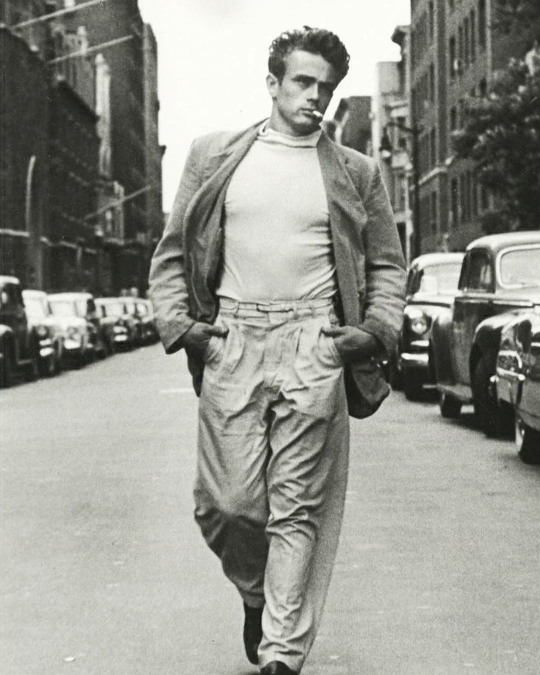

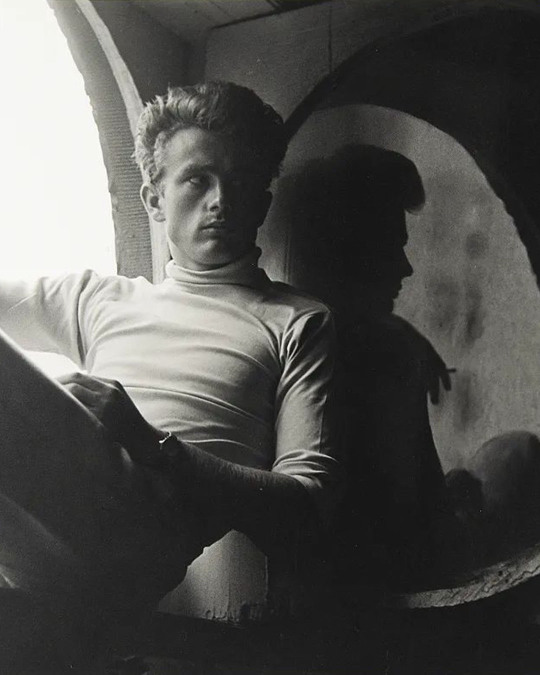
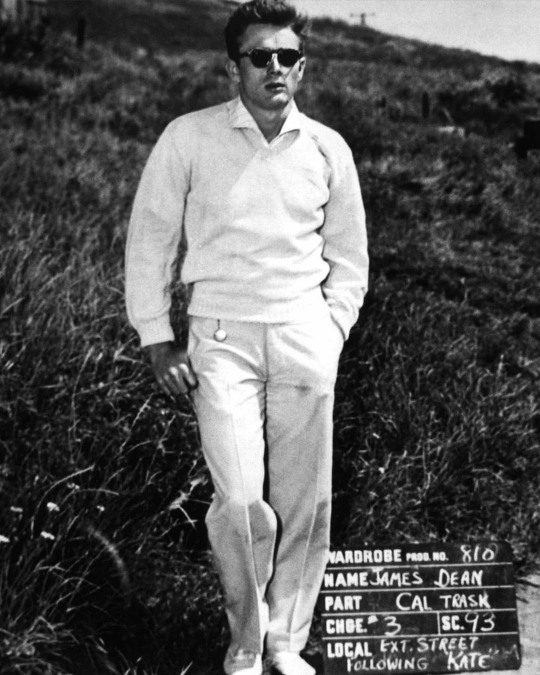
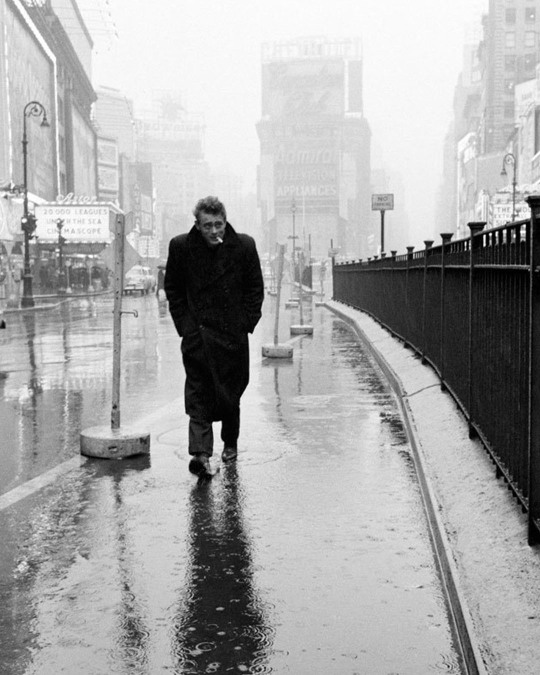
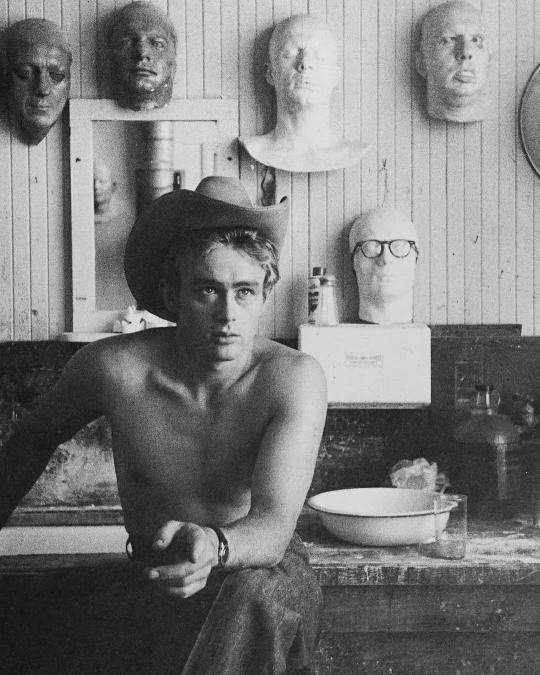

😎 Born on this Day: James Dean 😎
Today, 📆 we reflect on the remarkable achievements of James Dean (#Bi2), a true icon whose legacy endures through the ages. 🎥✨
🎬 James Dean's impact on cinema is immeasurable. With just three major film roles in "Rebel Without a Cause", "East of Eden", and "Giant", he left an indelible mark on Hollywood. 📽️ His performances were raw, emotional, and utterly captivating, earning him posthumous Academy Award nominations and solidifying his status as an acting legend. 🎭
🚀 Dean's persona as a rebellious, brooding, and sensitive young man made him a symbol of youth and defiance. 🔥 He represented a generation's desire to challenge authority and traditional norms, making him a cultural touchstone for those seeking to express their individuality and non-conformity.
📚 James Dean's iconic image as the quintessential "rebel with a cause" continues to shape popular culture. 🕶️ His effortless cool and classic style continue to inspire trends and designers. 👖
🌟 Perhaps one of James Dean's greatest accomplishments is the inspiration he continues to provide to generations. His short but impactful life reminds us to live passionately, pursue our dreams fearlessly, and embrace our individuality. 🫶🥹
#lgbt#queer#bisexuality#bi#lgbtq#lgbtqia#bi pride#bi visibility#bivisibility#representationmatters#rebel without a cause#james dean#old hollywood#icons#iconic#bisexual men#biseuxal#bisexual#bisexaul#bisexuell#lgbt history#lgbt pride
32 notes
·
View notes
Text
CREEPY Steve
2024 is the 50th anniversary of Stephen King’s first published novel, CARRIE. The story of a bullied telekinetic teen, who gets blood-soaked payback at her prom. Since then, he's written 65 novels, 200 short stories, and 5 nonfiction books. A freakish feat, almost worthy of one of his supernatural characters.
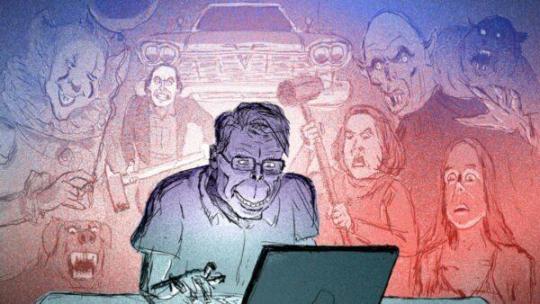
King’s first published story was when he was 19 years old. He continued selling short stories after graduating from the University of Maine, and while teaching English at a public high school, all later collected in NIGHT SHIFT. He's averaged more than a book a year since 1974. Many of his novels were initially released under a pseudonym, lest their sheer number dilute his ‘brand’. I became aware of King via the early movie adaptations of his books. CARRIE, THE SHINING, and THE DEAD ZONE. A great introduction, as those early films were all good, whereas most adaptations of his work are terrible, sadly.
During one of the Halloweens in the covid era, Julia & I got into a CREEPY STEVE frame of mind. Watching the better film adaptations, and listening to audiobooks. Those narrated by Will Patton were faves, as he really brings the characters to life. The Bill Hodges trilogy - Mr MERCEDES, FINDERS KEEPERS and END OF WATCH - were all marvellous, and introduced the wonderful character Holly Gibney. Who then appeared in further stories of her own.
There are 10 Stephen King short story collections, and all that I’ve read contain several gems. JUST AFTER SUNSET has the terrifying (yet somehow hilarious) tale of a man trapped and left for dead in a capsized porta-potty. DIFFERENT SEASONS contains the stories that inspired THE SHAWSHANK REDEMPTION and STAND BY ME. Donald Sutherland starred in a great film entitled Mr HARRIGAN’S PHONE, taken from IF IT BLEEDS. Which also contains another great Holly Gibney story.
ON WRITING: A MEMOIR OF THE CRAFT, is an engaging book, narrated by the author himself. Part memoir and part how-to instructional. Reminding me of William Goldman’s ADVENTURES IN THE SCREEN TRADE, in that it can’t truly deliver the secrets to making the magic that it promises, but serves up entertaining & revealing autobiographical anecdotes instead.
We are now used to seeing vampires in contemporary settings, so some of the 1970s impact of SALEM’S LOT has been lost. But both the book and its movie adaptation have many indelible images. Such as a vampire child hovering at the window.. (an inspiration for John Ajvide Lindqvist perhaps?)
After listening to book after book of King’s, and loving their brilliantly observed characters, and wonderful dialog, DARK TOWER was conspicuous for not having the elements that are normally intriguing in his books. Maybe I’ll give this series another shot someday, as friends swear it gets better.
We read THE SHINING and its sequel, DOCTOR SLEEP, watching & enjoying both movie adaptations. King apparently despises Kubrick’s version of THE SHINING - "The book is hot, and the movie is cold; the book ends in fire, and the movie in ice. In the book, there's an actual arc where you see this guy, Jack Torrance, trying to be good, and little by little he moves over to this place where he's crazy. And as far as I was concerned, when I saw the movie, Jack was crazy from the first scene.”
After reading the book, I understand King’s critiques, and agree with his second point. Jack Nicholson seems already about detonate on his drive to the hotel. Whereas King’s Jack was driven to madness by the malignant spirits within it. However, Kubrick’s film is so indelibly stamped into my mind, that I cannot unsee it. Nor unlike it neither (sorry, Stephen).
“Plot is, I think, the good writer’s last resort and the dullard’s first choice. The story which results from it is apt to feel artificial and labored.” - Stephen King.
I work in storytelling too, but in my biz it’s the dullard’s choice all the way - everything plotted & discussed, ad infinitum. King apparently starts with the merest idea, then writes straight ahead, surprising himself as he goes. A magician pulling a string of goodies out of his own head. At his best, this approach produces stories that feel naturalistic, with surprising twists and turns.
At his worst, it can be rambling, meandering and self indulgent. Especially when he struggled with addiction. Apparently, King was so out of control in the late 1980s, that he was confronted by an intervention after finishing the TOMMYKNOCKERS manuscript. A pity then that the editor wasn’t given more latitude in tidying up that waffling mess before it went to print..
Stephen himself agrees - “I mean, The Tommyknockers is an awful book. That was the last one I wrote before I cleaned up my act. And I’ve thought about it a lot lately and said to myself, “There’s really a good book in here, underneath all the sort of spurious energy that cocaine provides, and I ought to go back.” The book is about 700 pages long, and I’m thinking, “There’s probably a good 350-page novel in there.”
We enjoyed the screen adaptations of IT, CHRISTINE, 1922, THE MIST, and 11.22.63. After soaking in worlds King has created, on page & screen, it became clear that the recent NETFLIX hit, STRANGER THINGS, is merely glorified Stephen King fan fiction. By the end of the pandemic, we’d chewed through many stories, yet only a mere fraction of The King Catalog.
King is thought of as a master of the paranormal, but his real genius is for the everyday. Some of my favourites King stories are his straight crime fiction, or stories about real life. Even his famous horror stories are grounded by settings in relatable blue collar situations.. The writer Peter Straub even compared King to Dickens: “Both are novelists of vast popularity and enormous bibliographies, both are beloved writers with a pronounced taste for the morbid and grotesque, both display a deep interest in the underclass."
How does a man who’s been a millionaire for decades, with a very recognisable face, keep an ear for dialog patterns of common folk? Does he wear a disguise, and lurk in truck stops, diners, dive bars, and greyhound bus stations, taking notes?
“He's one of the first people to talk about real Americans and how they live, to capture real American dialogue in all its, like, foulmouthed grandeur... He has a deadly ear for the way people speak... …Surface-wise, King's work is a bit televisual, but there's really a lot going on." - David Foster Wallace
Lately, we’ve embarked on yet another quest to chip away at the KING oeuvre. Having already fallen in love with Bill Hodges & Holly Gibney, it was fun to watch the Mr MERCEDES TV series. Even though the filmmakers took liberties with the characterisations. Rather than the shy, smoking, middle aged, OCD woman of the novels, the TV Holly is a perky & cute 30 something. An autistic variation on the manic pixie dream girl trope. (sigh..)
Taken from a short story collection entitled EVERYTHING’S EVENTUAL, the gripping movie 1408, starring John Cusack & Samuel L. Jackson, is the creepy story of a skeptical paranormal investigator, whose cynicism is challenged by spending a harrowing night in an actual haunted hotel room.
In THINNER a selfish fat lawyer is cursed into anorexia by a gypsy. Entertaining, in 'the guy deserves everything he gets' manner of a parable from the Twighlight Zone. It seems to have inspired Sam Raimi's DRAG ME TO HELL.
GERALD’S GAME seemed like a story written on a bet, or an author’s exercise - “write a novel where the protagonist never leaves their bed for most of the story.” To me it felt like it might have worked better as a short story. When King fails (for me, anyway) it's when there hasn't been enough editing.
King has apparently said that PET SEMATARY was his book that scared him the most, and it is extremely creepy, but for me, MISERY was even more terrifying. I'd already seen the film, and Kathy Bates’ Oscar winning performance, but the book is even scarier somehow. There’s nothing paranormal about this story. There is utter horror, but it is the worst kind that there is - the twists & turns of the human mind.
Despite, or perhaps because of, King’s great popularity, literary critics long damned him with faint praise. In 2003, when he received the National Book Foundation’s ‘Medal of Distinguished Contribution to American Letters’, some became openly hostile:
"The decision to give the National Book Foundation's annual award for "distinguished contribution" to Stephen King is extraordinary, another low in the shocking process of dumbing down our cultural life… ..What he is is an immensely inadequate writer on a sentence-by-sentence, paragraph-by-paragraph, book-by-book basis." - Harold Bloom
Bloom is dead, so King gets the last word - “A lot of today's reviewers grew up reading my fiction. Most of the old critics who panned anything I wrote are either dead or retired".
In 1999, Stephen King was flattened by a vehicle while walking along a highway - "After the accident, I was totally incapable of writing. At first it was as if I'd never done this in my life. ...It was like starting over again from square one." As someone who was been flattened too (but in a very different way) one of the many inspiring things about King is how he recovered from that terrible accident, to do some of his very best work.
CREEPY STEVE is a one-man multimedia idea engine, keeping the publishing & Hollywood machines running. We are still enjoying poring through the King library (listening to THE INSTITUTE now) so if any of you have further recommendations, please let me know in the comments!
#essay#stephen king#illustration#The Shining#pet sematary#salems lot#supernatural horror#horror movies#horror fiction#holly gibney
13 notes
·
View notes
Text
sharing this article from today about HB. 🤍
Nominated for "Best Feature Film" at the Golden Rooster Award: "Hidden Blade": a hidden arrow that breaks the unspoken rules of box office for literary and artistic films


A classic is a kind of work,
It continues to give rise to clouds of criticism of it,
And keep getting rid of it,
It never completes what it has to say.
Hidden Blade, whose global box office is still rising, is the box office ceiling for domestic literary and artistic films. The background of this performance is that serious films have encountered an era of shallow reading, the industry and the public have been torn apart, and box office has become an undercurrent sweeping everything. However, because literary films do not conform to the shallow entertainment psychology, their niche nature is predicted by bloodthirsty and crude evaluations, and they are ahead of schedule. They are killed by film placement rate.
The true mission of film︱Making culture visible
The turbulent clouds and red color in the broad field of vision are somewhat incompatible with the festive atmosphere of the Lunar New Year. Released on the first day of the Lunar New Year, it is a kind of performance art in itself... It is very cliché, and it is exactly the same as the self-deprecation of super commercial films. As a spy war literary film, "Hidden Blade" has achieved a breakthrough in innovative expression of Chinese films, and its heterogeneity is unique among domestic films.
The dramatic tension of too many movies relies entirely on scenes and special effects, which disappear once they leave the theater. "Hidden Blade" creates a huge psychological magnetic field, which is still exciting even if it is separated from the audio-visual environment. The tone threshold of "Hidden Blade" is not some kind of contempt for the audience, but the ultimate respect for the audience, history, and movies.
Literary films are a type of film relative to the concept of commercial films. They focus on artistic expression and cultural connotation, and try to pursue higher aesthetic values and cultural significance. Their production is also different from commercial films: commercial films pursue commercial interests or mass entertainment, and take the movie box office as the main goal, while literary films focus on the artistry and cultural connotation of the film.
Transgressing norms and offending common sense, art films are pioneers of film. They often fail but expand the boundaries of film. There are two literary classics in the history of world cinema, "The Shawshank Redemption" and "Westward Journey". They failed miserably at the box office when they were first released. However, they accumulated a large number of die-hard fans through the later dissemination of images. After years of accumulation, they became indelible classics.
The core of the value counterattack between the two works is still that gold will always shine.The former's exploration of human nature and social systems has created a milestone in modern cinema, while the latter's postmodern deconstructive stream of consciousness has won resonance in an era of subversion of tradition.
As a cultural carrier, movies are the most intuitive and transparent value expression of the thoughts of the times. Although most of the classics handed down from ancient times are not the true understanding of the thinkers' era, they have been accepted by the public after years of precipitation. As a result, classics continue to increase in value over the course of history. This is the power of classics and the reason why we respect classics.
As early as in "The Death of Romance", Cheng Er used lines to express his feelings, "Movies are made for the audience of the next century." Look, for artists who break through the context of their times, the feedback they receive from the times is often lagging or misaligned, although this misalignment itself is precisely the connotation of the avant-garde. Yes, art films have always been a disadvantaged group in the industry that suffers at the box office.
In contrast to the tragic box office situation, the ambition and strength of literary films in film art awards. This is also the reason why "Hidden Blade" recently swept the 36th Golden Rooster Awards, with 8 major nominations and caused controversy among public opinion.
The existence of "Hidden Blade" is indeed an isolated example of a domestic literary film. With a box office of 931 million, it is not only the highest-grossing film in director Cheng Er's career, it is even several times the total box office of all his previous works! It's so stunning that "Hidden Blade" has always been criticized by the public, expelled from the art film camp by default in the name of "removing the highest score"!
"No one knows your name, but your achievements are immortal." The grand proposition of the unknown hero in "Hidden Blade" is more sentimental about family and country than any of Cheng Er's previous works. And does this main theme of "greatness, light, and justice" fit in with the art film's original understanding of "the world, society, and life" for individuals and the authorial expression of film language?
"Hidden Blade" is not the first of its kind to draw on commercial marketing for a literary film. At that time, "Fireworks in the Day" was announced as a romantic suspense film, and it received similar reviews and received double box office revenue. It can be seen that only true literature and art dare to joke about "super commercial films".
Cheng Er responded to this joke in an interview with "China News Weekly", "I was editing the film that day, and then they came in with their mobile phones to show me, and said that everyone still thought it was too literary, and I said let's just type a line. Come out - a super commercial film. This is a joke, and indeed no one put such a slogan in the trailer."
He said that he just found it interesting and that there was nothing to rebel about and it was not worth rebelling against. Confidence and relaxation are often qualities of an artist. These qualities make people stand out like fireflies in the dark, allowing the public to quickly pick them up from the crowd. And Cheng Er slowly titled a serious film "super commercial film" because of his humor.
Movies are not just an art of light and shadow | they are also an art that can cultivate people
Low box office is not the standard for art films. “When art is dressed in shabby clothes, it is easiest for people to recognize it as art.” However, this is not an essential representation of art, but the quality of the audience that needs to be improved. The complaints faced by "Hidden Blade" are the same as those faced by literary films as a whole, which is the contradiction between the film's authorial expression and public acceptance.
But does literature and art have to be a niche? Does it deserve to be obscure and slow-paced? Come to think of it, no one is more qualified to answer than "Hidden Blade", who has boiled the black water into a world of wealth and led the public's aesthetic appreciation with niche art!
The most representative narrative style of Cheng Er's films is "flashback narrative", which established his unique creative and imaging style. It invites the audience to participate, rely on brain supplements to build together, and gain the pleasure of decoding. It is a true "understanding", and it is easy to be confused if you don't understand. Such films pursue aesthetics and reflection, and are usually aimed at more mature and artistic audiences.
Movies are products of the cultural industry and are essentially consumed cultural products. In the context of the influx of capital and hot money into the film market and the industrialized mass production of film culture, commercial films are certainly high-return cultural snacks tailored for audiences. Even the creators of literary and artistic films are hard-pressed to avoid being judged by box office success . "The concept of influence or even kidnapping.
It is common for literary films to sell less than 5 million yuan. From Chen Zheyi softly asking the sky, "Why are elegant and gentle people scolded?" to Huang Xufeng angrily choking netizens, "I have no merit but hard work." There is no antidote in the world. The reason why literary and artistic films are criticized is often because in the fast-food era of shallow reading, literary and artistic films have to embrace the sinking market and attract non-target audiences in order to pursue box office.
But movies are just products? No, it is still a cultural expression and a carrier of social values. Comparing movies to products, then literary and artistic films are obviously not fast-moving consumer goods. When facing capital and the market, how can they be in line with the public while not losing their authorial nature? Cheng Er said, "Good-looking art films are also good commodities, and excellent commercial films are also a kind of art."
When it comes to art, most people may think that art is highbrow, aloof, and far away from daily life. And this is not the case. Yu Hua said in the roadshow of "The Mistake by the River", what does it mean to understand? In fact, it is whether it can overlap with our own life experience. If there is overlap, you can understand it. If there is no overlap, you can't understand it. That's normal.
In this explanation, understanding or not understanding is not profound. And Cheng Er has always said that the audience should not be underestimated. People who watch movies are influenced by their own likes and dislikes. Whatever they feel is what they have. Whether they understand or not is not that important.
The audience should not be too demanding to understand, and the artist should also be down-to-earth. Art for the sake of art is not true art. "Hidden Blade" is not only a literary film, but also a literary footnote to Chinese films, because it truly expresses the cruelty of history but is still full of artistic beauty. Cheng Er is very familiar with the history of the Republic of China and knows the intricate relationships between characters.
"Hidden Blade" is composed of real historical details as fine as twists and turns. When I say I can’t understand it, I’m not expressing disdain, but living in China, it’s difficult to understand the history of 5,000 years of civilization, but there is absolutely no threshold for mastering the history of the Anti-Japanese War! It is understandable that one cannot appreciate the narrative technique due to aesthetic differences, but the Internet atrocities of selling one’s soul for five cents and tainting the theme of the film are unforgivable.
There is no universal set of aesthetic rules in the world, but artists try to legislate aesthetics. Every era has its own branded dogma, until the next generation of artists establishes their own profession. Therefore, Gombrich exorcized art and said, "There is no art, only artists." He hoped that the world would stop enshrining art in shrines and use mystery and sacredness to Feeling separates oneself from the work.
There is also a similar "death of the author theory" in the literary field, which means that the author is as if dead when the work is born, and the interpretation and evaluation of the work are left to the readers. That is, there are a thousand Hamlets for a thousand readers, and there is no standard answer.
Just like we cannot require every movie to go straight to the international film festival awards, but also to hit the hearts of the audience and be a classic that will be passed down forever. We cannot require every movie viewer to have high film literacy from the beginning, and to be able to get the spiritual resonance of the creative intention. The growth of movies, filmmakers, and movie audiences requires more tolerant soil and space.
Of course, there is really little space left for literary and artistic films in theaters now! No matter at home or abroad, when the public unanimously agrees that "artistic films deserve low box office", please understand that the industry should leave some room for exploration for artistic films. Allow them to be ignorant of the customs, and only on the soil of tolerance can viable artistic flowers bloom.
Social aesthetic value orientation︱The purpose and driving force of movies
"A lame dog walks through the bombed street scene." One day, Cheng Er took a pen filled with ink and wrote this sentence on the paper. At that time, no one, including himself, knew it, but it was becoming the starting point for a movie called "Hidden Blade," and this moment of brutal aesthetics became the famous scene of the movie.
Personal aesthetics are free, but social aesthetics has a paradigm. Education and social culture will influence and standardize aesthetics and shape aesthetic orientation. Different eras and different environments have different aesthetic orientations, and different aesthetic orientations make people make different value choices. That is to say, no matter how free the aesthetics and how diverse the values are, as long as the rice is sown, it will never grow into tares.
Art and commerce are the two legs of movies. Art movies are full of vitality, and commercial movies are lively. When the leg of literature and art is lame, it is not unfair that Chinese films have been reduced from regulars on the awards podium at international film festivals to regulars on the red carpet.
Yes, there is indeed a "silver-like pewter tip" in the name of art. When artistic conscience is marginalized by desire, the so-called art becomes only a barren and pale flower shelf that cannot withstand scrutiny and argumentation. But "Hidden Blade" allows us to see how an exquisite literary film is polished and shaped, and even simple film layouts contain shooting skills.
Generally, it is the director's habit to record the scene first, then the actors perform, and the cameraman follows the camera movement, but this is not the case on Cheng Er's set. Wang Yibo once mentioned that the crew respects the actors very much. The filming scene is very quiet. Once the mood enters the state, the photographer shoots directly. After the scene is finished, the filming will be finished. The filming will never interrupt the actors' brewing emotions.
In the later stage, Cheng Er slept directly in the studio and only did one thing every day, cut, cut, cut! Thanks to his almost fanatical work status, Cheng Er didn't even get exposed to the sun last year! It took seven years to sharpen a sword, just for a different Chinese movie. Incorporate the main melody into genre movies, and use the language and audio-visual rhythm of genre movies to achieve innovative expression of the main melody theme.
"A truly good movie must be more commercial than commercial and more artistic than art. For me, what I have always wanted to do is to be more commercial than commercial and more artistic than artistic." Cheng Er said this and did the same.
Cheng Er's images are full of subtle metaphors. Puppet Manchukuo, Shanghai, and Hong Kong, the spiritual narrative about the city in "Hidden Blade" permeates the architectural language of Rongzhai, No. 76, No. 567 Xiafei Road, Central Market, and Man Mo Temple; it is hidden in Japanese, Shanghai dialect, The mixture of pidgin and Cantonese arouses emotional resonance and deep thinking in the audience.
The Puppet Manchukuo, which only exists in the dialogue between Watanabe and Mr. Ye, is like a ghost with the chill of a daydream; the isolated island in Shanghai, which occupies the main part of the film, exudes luxury and inconsistency in its exquisiteness; and Hong Kong, as the hub of the international anti-Japanese united front, is full of human fireworks, revealing a simple and soothing world.
Dark clouds are pressing down, devastation is everywhere, and at the end of the tunnel, the historical information in the image of the current situation is compressed into a minimalist narrative, waiting to be decompressed. Until the dark wormhole of the theater, the historical words in the spy war narrative rushed towards us...
The anti-Japanese drama consumes misery, the anti-war themes are reproduced in large numbers, and the massacres cause psychological discomfort... In the past, expressions of the history of national suffering often followed the rules of exposing cruelty, exposing blood, and even exchanging violence for violence. What is shocking about "Hidden Blade" is that it uses beauty to overcome ugliness. It is amazing: It turns out that suffering can be interpreted calmly, with warmth and depth! "You can't get involved in the frame," is the domineering determination of the man behind the scenes.
Light and heavy, cold and warm, it completes the unfinished soul judgment on a country's sin of aggression in reality. In the sense of cultural export, "Hidden Blade" integrates the isolated history of China's anti-Japanese resistance into the world narrative of the great history of World War II.
It is a message from the times to the times. In the theater, "Hidden Blade" makes us feel the power of literature and art. After walking out of the theater, you will naturally understand what the merits of the unknown are!
#wang yibo#hidden blade#hidden blade movie#accio victuuri translation#ITS TIME FOR HIDDEN BLADE REWATCH EVERYONE!!!!!!#i might as well play it while in working lol#THIS >>> they are killed by film placement rate.#THIS IS A LONG READ SO BE WARNED. ITS GOOD THO. i have a feeling WYB will dominate domestic literary film genre so yeah ~
41 notes
·
View notes
Text
Sebastien Auclair
The Exchange Student

Sebastien Auclair | 21 yrs old | he/him:
Sebastien is in his third year of university attending NYU as an exchange student from the Paris College of Art. Although deeply rooted in his love for Paris, he's embarked on an exciting journey, studying photography and imaging in a different cultural landscape. Sebastien finds solace in the unfamiliar, always eager for a change of scenery.
Sebastien's one constant companion is always a camera, be it digital or film. Whether capturing the essence of a moment or freezing the play of light and shadow, he approaches photography with a mature eye and an innate talent for visual storytelling. A connoisseur of both refined and simple pleasures, Sebastien revels in the ambiance of a good jazz bar or losing himself in the pages of photo books at the library. His proficiency in English is notable, but occasionally, he encounters those untranslatable moments where words fall short.
Fueling his creative pursuits and late-night editing sessions is Sebastien's love for coffee. An avid espresso enthusiast, he secretly harbors a sweet spot for affogato, a taste that harks back to his part-time role as a barista in his brother's café in Paris. This exchange student seamlessly blends maturity with an easygoing nature, leaving an indelible mark on both his art and the coffee cups he leaves in his wake.
Scroll all the way down for a mini Q&A with Sebastien!
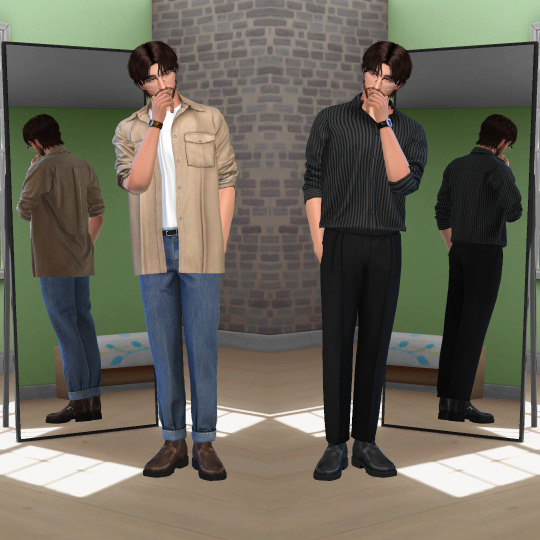
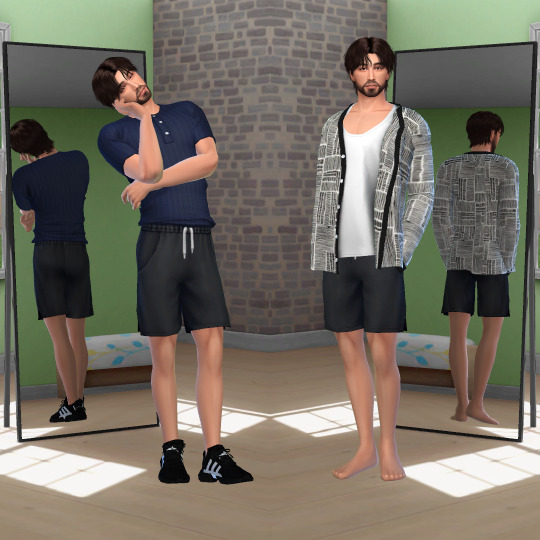
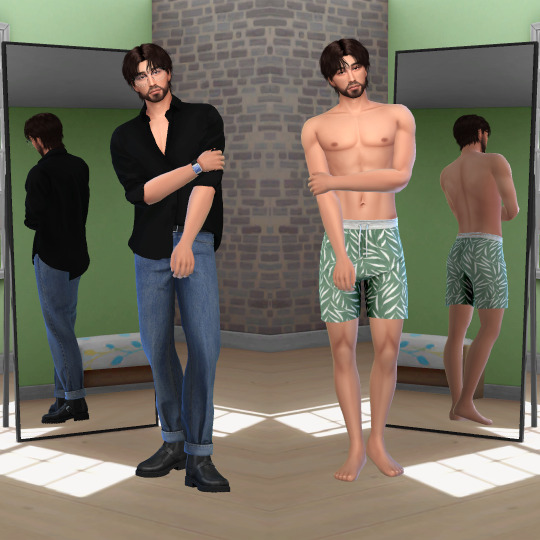
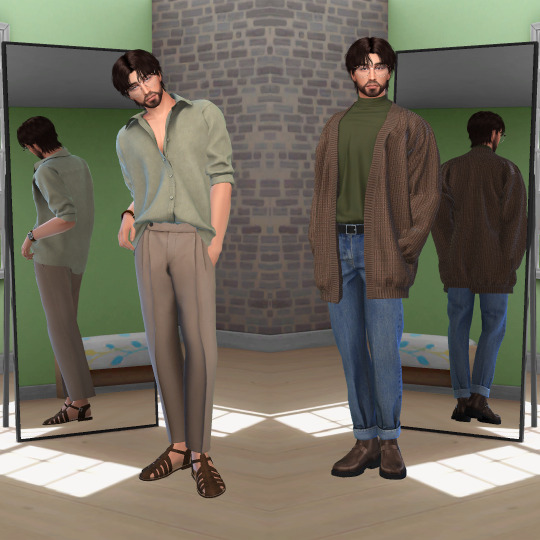
Top row left to right: Everyday, formal, activewear, sleepwear
Bottom row left to right: Party, swimwear, hot weather, cold weather
Sebastien Q&A
Q: What’s your sign?
A: My birthday is November 13, I think my sister said that means I'm a scorpion, oh I mean Scorpio. Is that right? What does it mean?
Q: How tall are you?
A: I'm 185 cm, oh or, I guess 6 feet 1 inch.
Q: Name your top 5 artists your listening to?
A: My top 5 favorite artists include Miles Davis, Chet Baker, Cecile McLorin Salvant, Billie Holiday, and Jazznova I really love their Funkhaus album.
Q: What’s your favorite food?
A: There was a great Greek place near my old place back in Paris so I have a fondness for Greek moussaka. The layers of eggplant, minced meat, and creamy béchamel are a really nice combination.
Q: What’s your ideal date?
A: First we go listen to some live jazz, we can share hushed conversation or dance depending on the energy from the band. Following the music-filled evening, we can fill or stomachs with tapas at a cozy Spanish restaurant, savoring the flavors of patatas bravas, chorizo, and gambas al ajillo.
#choice of games#choose your own adventure#choose your own story#dashingdon#interactive fiction#interactive if#twine if#twine interactive fiction#character profile#choice script#twine story#twine game#if: themuse#themuse if#ts4#cast
27 notes
·
View notes
Text
Greene and Broome Street

Greene St & Broome St New York, NY 10012
Unveiling the Mystique of Greene St & Broome St: 15 Enthralling Facts About a New York Icon
New York City's intricate tapestry is woven with countless stories of its neighborhoods, streets, and intersections. Among these, the intersection of Greene Street and Broome Street emerges as a captivating narrative of history, art, fashion, and innovation. Situated at the crossroads of SoHo and Nolita, this intersection beckons with its charm and allure. Let's embark on a journey of discovery as we delve into the 15 most enthralling facts that define the essence of Greene St & Broome St.
A Living Canvas of History: At the heart of the SoHo Historic District, Greene St & Broome St bear the marks of time etched in their cobblestone streets. The intersection's buildings, standing as sentinels of a bygone era, serve as a living testament to the city's ever-evolving story.
The Bohemian Legacy: Once a haven for industrial warehouses, this intersection underwent a radical transformation in the 1960s when artists seeking affordable spaces to live and work breathed new life into its buildings. The likes of Basquiat, Warhol, and Haring left an indelible mark on the neighborhood's creative spirit.
Elegance in Iron: Look up, and you'll be greeted by the intricate cast-iron facades that adorn many of the buildings. A relic of the 19th century, this architectural marvel juxtaposes the past and present, making for an enchanting streetscape.
Haute Couture Haven: Greene St, once a thriving mercantile center, has evolved into a mecca for fashion enthusiasts. Its storied past as a textile and garment hub echoes through its present as high-end boutiques and luxury brands line the street.
Culinary Crossroads: Broome St's culinary tapestry is a reflection of the city's melting pot. From artisanal bakeries serving delicate pastries to ethnic eateries dishing out global flavors, the intersection invites you on a gastronomic journey.
Silver Screen Charisma: Broome St's cinematic allure has earned it a role on the silver screen. Its eclectic architecture and urban energy have played supporting roles in various films, contributing to the city's cinematic identity.
Prohibition Echoes: Veiled within the streets are speakeasies, paying homage to the Prohibition era when hidden bars thrived in secrecy. These modern-day hideaways whisk patrons away to an era of clandestine indulgence.
Gallery Row: Greene St stands as an artistic enclave, housing a myriad of contemporary art galleries. From avant-garde installations to thought-provoking exhibitions, the street pulsates with the creative heartbeat of the city.
Green Initiatives: In the spirit of sustainability, Greene St & Broome St host eco-conscious establishments that champion green living. These shops reflect the city's commitment to fostering a more eco-friendly urban landscape.
Street Art Symphony: The intersection's energy resonates through spontaneous street performances. Musicians, dancers, and artisans converge to create an ever-changing urban symphony that enchants passersby.
Timeless Cobblestones: Beneath your feet, the cobblestone streets evoke the whispers of a bygone era, invoking images of horse-drawn carriages and early industrial life.
Urban Muralscape: Street art adorns the intersection's walls, painting a vivid picture of the community's essence. These murals are not just decorations; they serve as a testament to the neighborhood's ever-evolving identity.
A-List Haven: Greene St & Broome St have played host to celebrities seeking a genuine New York experience. From inconspicuous coffee shops to fashionable boutiques, A-listers often grace these streets.
Guardian of Time: The majestic clock tower that stands at the corner of Greene St & Broome St is a historical sentinel. This architectural masterpiece, with its timeless elegance, stands as a steadfast witness to the changing cityscape.
Retail Revolution: Greene St & Broome St embrace retail innovation with flair. Pop-up shops, concept stores, and cutting-edge retail spaces redefine the shopping experience, reflecting the city's constant evolution.
In a city that thrives on diversity and dynamism, Greene St & Broome St carve out their own distinct identity. They encapsulate the spirit of New York City - a melting pot of cultures, ideas, and aspirations. As you traverse these storied streets, allow yourself to become immersed in their tales. Whether you're a seeker of history, an aficionado of art, or a connoisseur of style, the intersection of Greene St & Broome St will etch itself into your heart as an emblem of the city's ceaseless innovation and undying allure.
#Greene St#Broome St#SoHo#New York City#new york#newyork#New-York#nyc#NY#manhattan#urban#city#USA#buildings#visit-new-york.tumblr.com
85 notes
·
View notes
Text

Raquel Welch, Actress and ’60s Sex Symbol, Is Dead at 82
Beginning with a doeskin bikini in “One Million Years B.C.,” she built a celebrated show business career around sex appeal and, sometimes, a comic touch.
By Anita Gates
Feb. 15, 2023
Raquel Welch, the voluptuous movie actress who became the 1960s’ first major American sex symbol and maintained that image for a half-century in show business, died on Wednesday at her home in Los Angeles. She was 82.
Her death was confirmed by her son, Damon Welch. No cause was given.
Ms. Welch’s Hollywood success began as much with a poster as with the film it publicized. Starring in “One Million Years B.C.” (1966) as a Pleistocene-era cave woman, she posed in a rocky prehistoric landscape, wearing a tattered doeskin bikini, and grabbed the spotlight by the throat with her defiant, alert-to-everything, take-no-prisoners stance and her dancer’s body. She was 26. It had been four years since Marilyn Monroe’s death, and the industry needed a goddess.
Camille Paglia, the feminist critic, described the poster photograph as “the indelible image of a woman as queen of nature.” Ms. Welch, she went on, was “a lioness — fierce, passionate and dangerously physical.”
79 notes
·
View notes
Text
The Sunnydale Herald Newsletter, Thursday, December 5th and Friday, December 6th - Part One
SWEET: I'm the hot swing I'm the twist and shout [tapdances] When you gotta sing, When you gotta ... let it out.
~~Once More With Feeling~~
[Drabbles & Short Fiction]

Dreamworks by mabus101 (Anya/Tara, M)
I'll See You In My Dreams by OddDodd (Buffy/Giles, M)

Falling for the vampire by ashwhowrites (Willow/vampire!reader, not rated)

Slayer’s blood by Lilacsandorangeblossoms (Buffy/Spike, R)

Lump of Coal by ClowniestLivEver (Buffy/Spike, R)

Christmas Blackout by veronyxk84 (Buffy/Spike, T)
Candles in the Window by veronyxk84 (Buffy/Spike, T)
[Chaptered Fiction]

Soul Mate Magic, Chapter 20 (complete!) by Emma_M_Black (Giles/OC, M)
Indelible, Chapter 8 by indeliblemelody (Giles/reader, M)
Miss Summers Goes to Washington, Chapter 9 by storiwr (Buffy/Faith, E)
The Original Buffy Summers, Chapter 3 by broodybaby (Buffy/Spike, M)
Maps, Chapter 6 (complete!) by thisyearsgrrl (Buffy/Faith, E)

Spuffified: A Collection, Chapter 7 by satinsafe (Buffy/Spike, PG-13)
The Degradation of Duality [Series Part 2], Chapter 66 by Ragini (Buffy/Spike, NC-17)
Carol of a missing lipstick, Chapter 9 by rossshin (Buffy/Spike, G)
Comin’ to Town, Chapter 2 by Melme1325 (Buffy/Spike, NC-17)

The Magic of Sunnydale, Chapter 12 by Buffyworldbuilder (Scoobies, Harry Potter crossover, FR15)
Why Me? Chapter 17 by JoeB (Buffy, Lilo and Stitch crossover, FR7)

Eyes Forward, Monster, Chapter 10 by Desicat (Buffy/Spike, Adult Only)
The 12 Days of Christmas, Chapters 1-13 (complete!) by RavenLove12, Geliot99 (Buffy/Spike, NC-17)
[Images, Audio & Video]

Artwork: The first Christmas of many by JSBirsa (Scoobies, worksafe)

Artwork: Giles by hexedhat (worksafe)
Collage: #256 [Spike] by thedecadentraven (worksafe)
Collage: #257 [Buffy/Spike] by thedecadentraven (worksafe)
Artwork: I'll Never Tell by x66r9u (Xander/Anya, worksafe)

Fanvid: Buffy Summers - Wasteland by Faith Victoria
Fanvid: Buffy & Spike || New Depths by Tifa&Rinoa
Fanvid: Buffy & Spike - My Old Man is a Bad Man | Lana Del Rey - Off to the Races by Buffy & Spike Channel
Fanvid: Buffy & Spike | Tempt My Trouble by KcchameleonProdz
Fanvid: Buffy and Angel - Goodbye by Rita Carvalho
Fanvid: Buffy & Dawn | She gets away with everything by Tara's_Willowverse
Fanvid: Spike & Buffy - Darkside by William Pratt
Video: BtVS | Spike - Well, I sing ... by William Pratt
Video: Buffy's Scythe! Replica Prop by Factory X detailed REVIEW and restoration in 2024!! by Dripped In Plastic
[Reviews & Recaps]

Ok this season just got serious! | S3 E14-15 “Bad Girls” and “Consequences” by The_Fullmetal_Titan

I have a confession to make: I don’t think I like Selfless very much by coraniaid

Video: Buffy's Musical Masterpiece... by Jack Antrobus
Video: Touched-Slayer Sunday by Jane Talks Buffy
Podcast video: Buffy S03E09 "The Wish" Spoiler Review by LGRN - Entertainment
Podcast video: Buffy's Angels: Deep Down by The Franchise: A Film Podcast
Podcast video: Buffy the Vampire Slayer: Season 3 Episode 11 - Gingerbread by Sh*t 90s Shows Taught Me
Podcast: Storyteller S7 E16 Buffy and the Art of Story by Lisa M. Lilly
Podcast: Buffy the Vampire Slayer: Season 3 Episode 10 - Amends by Sh*t 90s Shows Taught Me
[Recs]

Fanvid rec: Slayer by thedothatgirl recced by Priceless
Fic rec: The Sound of the Universe Coming Back (Buffy/Spike, G) by Shaitanah recced by Priceless
Fic rec: all we have (Dawn, G) by taxicab12 recced by Priceless
6 notes
·
View notes
Text
This is such an interesting article about the origin, concept and visual development of this movie (The Flight of Dragons in case the link doesn't show it). Go take a look!
#the flight of dragons#concept art#fantasy movie#fantasy animation#fantasy animated movie#movie development#visual development
5 notes
·
View notes
Text
Cosplay the Classics: Maya Deren in Meshes of the Afternoon (1943)




My closet cosplay of Maya Deren in her film Meshes of the Afternoon
I’ve been sitting on this cosplay for a shamefully long amount of time at this point. Originally, I thought to myself, “self, there’s no need to write anything long-form or meaningful to accompany this cosplay. Everybody knows Maya Deren.” But, then I did a quick little search around the internet and felt the inauspicious tug of the Curse of Knowledge.
Over the eighty years since Maya Deren made Meshes of the Afternoon, images of Deren have become emblematic of experimental film, both here in the United States and internationally. I’ve been privileged enough in my life to have formally studied the history of independent film in America and have also worked at an institution that specializes in preserving avant-garde film. So, for me, Deren’s shadow looms large. She is, no exaggeration, one of the most important figures in the American experimental film tradition. On tumblr, Deren’s image (particularly in Meshes of the Afternoon) has proliferated even further with popular sets of gifs and stills. That said, I can’t pin down quite how much the average film fan knows about Deren’s films and ideas. To put some things in context, I’d like to start by highlighting how she became an icon of experimental film.
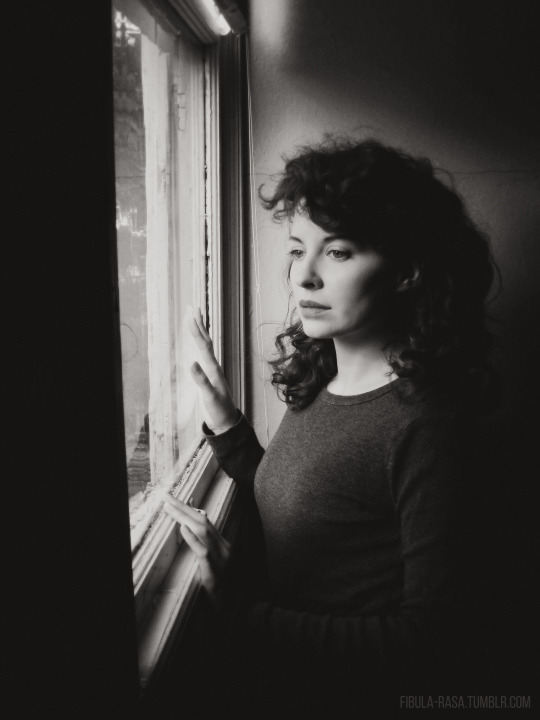
Picture it: America in the 1940s. You’ve delved into filmmaking for the first time without a production company behind you. You’ve independently created a short, silent, poetic, experimental film at the height of the US’ studio era. The same qualities that might classify a film as niche today were even more pressing in the 1940s. So, how do you get it seen? Maya Deren had some ideas about that.
Deren was confident in film as an artistic medium. Over the course of the 1940s and 1950s, Deren arranged her own screenings by renting out a playhouse, and marketed and packaged her films for universities and artistic and cultural institutions in the US and in Europe. Deren also wrote pretty extensively about film form and also about the nature of and meanings behind her films. Deren would also speak at screenings of her films. So, basically, before there was a festival circuit or arthouses or cinematheques in the US, Deren positioned herself as author and primary marketer of her films. This necessary self promotion was pattern setting for the time, but also created an indelible association between her image and the developing independent film scene in mid-century America.
Deren’s image being the emblem of experimental American film is largely due to the way she continually promoted her films and engaged directly with her audience and with discussions around her work. (Additionally, seeing as Deren’s movies were self-produced, how much she could make renting and screening the films would provide the budget for the next film.)
If you’ve gotten this far in this write up and haven’t seen many/any of Deren’s films, first of all, thanks, but second of all, I recommend checking out a triple feature of films commonly grouped together as her “trance” films: Meshes of the Afternoon (1943), At Land (1944) [my personal fave], and Ritual in Transfigured Time (1945). They are all less than 15 minutes by the way, so don’t be daunted at the suggestion of watching three films in a row! Keep in mind that all three of these films were initially conceived of and released without a soundtrack. There is an authorized score for Meshes of the Afternoon composed later by Deren’s third husband, Teiji Ito, but how well that score serves the film is debatable. So, depending on where you choose to watch her films you may want to watch them soundlessly the first time, just to be sure that the music doesn’t get in the way. (Though I will say some of the scores I’ve seen people make on their own are crackerjack!)
As a preface to your viewing experience, I’d like to advise you not to get too caught up in overly logical and literal thinking—don’t intellectualize. Getting too hung up on whether you “got” a piece or art or not is just a barrier to genuine experience. Oddly, this is something I bang on about a lot in real life (and maybe I have on here before, I don’t remember) but it was pretty exciting reading more of Deren’s writing and coming upon this very relevant passage:
“It is therefore relevant to underline, here, the fact that the appreciation of a work based on experiential, or inner, realities consists not in a laborious analysis based on the logic of a reality which a ‘prepared’ spectator brings to the work. It consists, rather, in an abandonment of all previously conceived realities. It depends upon an attitude of innocent receptivity which permits the perception and the experience of the new reality. Once this reality has been perceived and experienced, its logic may be deduced if one wishes. Such a deduction is not necessary to the perception and can only follow it as a secondary activity, much as an analysis of love, for example, can only follow upon the experience but can never induce it.”
— Cinema as an Art Form" by Maya Deren, New Directions 9, 1946
The anecdote I often bring up to illustrate “innocent receptivity” to people who are reticent to take my advice is from David Lynch. Lynch recounts a private screening of his work for Mel Brooks when Brooks was considering him to direct The Elephant Man (1980), which Brooks was producing. Lynch assumed that that was the end of the line for him, but instead, Brooks loved his films and shared his own emotionally-grounded read on Eraserhead (1977). Lynch hadn’t anticipated Brooks’ intelligence as an artist and film enthusiast or his receptivity to the form. Lynch was obviously hired. Basically, we could all do with being more like Mel Brooks.
If you get the chance, and you’re interested in expanding your understanding of film as art, I strongly recommend checking out Deren’s writing. Her prose might seem florid, but I promise it’s a floridity based on precision of explanation, it’s not an exclusionary type of wordiness. There is a collection of some of Deren’s work from 2004 called Essential Deren (available on the Internet Archive). I’ve also been considering recording a reading of her essay “Cinematography: The Creative Use of Reality” if having an audio file would be appealing to anyone?
Well, thanks for making it all the way through! I know I haven’t really been doing longer-form stuff for this blog lately. Words are kind of a struggle for me and I get pretty easily discouraged to express myself with them, but upon reflection, I knew Maya Deren deserved the effort. I hope that I’ve provided sufficient inducement for you all to check out her work!

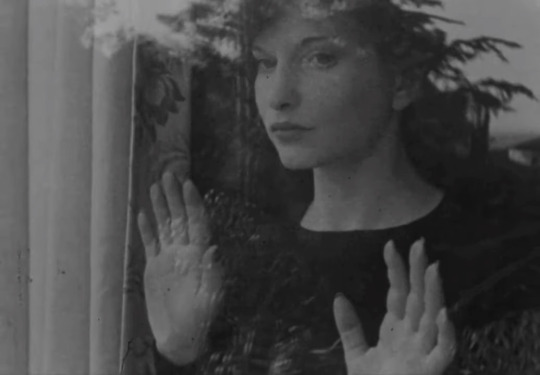
A couple of reference photos for my closet cosplay
P.S. I posted some excerpts of Deren’s writing over on my “whatever” tumblr
Buy me a ☕
#Maya Deren#Meshes of the Afternoon#1940s#1943#cosplay#cosplay the classics#closet cosplay#american film#independent film#avant-garde film#experimental film#female filmmakers#female filmmaker friday#film#movie recommendations#classic film#film blog
37 notes
·
View notes
Text
It was requested that I make a part 2 for this post
Here is the chaotic ending me and @xxluckystrike have been talking about. I can also make the wholesome ending if anyone wants that instead!!
The inspiration
---
The September sun poured through the stained glass windows of the quaint Louisiana church, bathing the aisle in a kaleidoscope of colors. Arm in arm with her father, Claire glided between the pews like a vision from an old Hollywood film. Her brown hair, set in soft waves, framed her face—a visage of quiet strength honed from her time as a combat medic with Easy Company. Her glasses caught a glint of sunlight as she took each step with poise, her tall figure draped in ivory lace.
"Look at her, Grant. Ain't she something?" Talbert whispered, his dark blue eyes focusing on Claire's graceful advance toward Eugene, who stood at the altar with an air of dignified anticipation.
Grant felt the words catch in his throat, unable to tear his gaze away from Claire. His best friend was right; she was a sight to behold. But it wasn't just her outward appearance that captivated him—it was the way her brow would furrow in concentration or the slight crinkle by her eyes when she laughed.
"Beautiful," Grant finally managed to say, but the word seemed insufficient to describe the torrent of emotions he felt. His blue eyes, usually so calm and serene, blazed with an intensity that betrayed his stoic exterior.
"Easy there, Romeo," Liebgott chided softly from Grant's other side. "You're gonna burn a hole through the bride with that stare."
Grant offered a weak smile, trying to mask the inner turmoil that was threatening to spill over. He could feel the heat of the Louisiana afternoon seeping into the church, or perhaps it was the heat of his own inner conflict.
"Can't help it," Grant muttered, almost to himself. "She was always..."
"Meant for Eugene," Talbert finished the sentence with a knowing look. He placed a hand on Grant's shoulder, grounding him. "You know that, right?"
"Right," Grant said, but his voice lacked conviction. He watched as Claire reached the altar, her father lifting her veil before placing her hand in Eugene's. The two exchanged a look that spoke volumes—their shared history, their bond forged in the crucible of war, their future laid out before them.
"Should've been me," Grant breathed, so faintly that only Talbert, leaning in close, could hear.
"Hey," Talbert said, squeezing Grant's shoulder a bit tighter. "We all have our paths. Yours is still unwinding."
Grant nodded, knowing his friend was right, but feeling the weight of what could have been pressing down on him. He forced his attention back to the ceremony, to the moment unfolding before him, but the image of Claire walking down the aisle was etched into his memory, as indelible as the scars they all carried from the war.
The organ's solemn hum filled the small church, casting an almost ethereal veil over the congregation. Grant's hands were clasped tightly in his lap, knuckles whitening as he fought a tumultuous battle within himself. The scent of lavender and old hymnals mingled with the whispers of fabric as people shifted in their seats, all eyes forward on the bride and groom standing before the altar.
"Dearly beloved," the reverend's voice resonated through the silence, "We are gathered here today to join this man and this woman in holy matrimony."
Grant's throat tightened at the words. He could feel Claire's presence, an invisible force that seemed to draw him in, even as she stood at the altar ready to pledge her life to another man. His jaw clenched, blue eyes flickering with emotions he was struggling to contain.
"Love is patient, love is kind," the reverend continued, unaware of the storm brewing within one of the guests.
"Damn it," Grant muttered under his breath, his gaze fixed on the wooden pattern of the pew in front of him, as if it held the answers to the turmoil inside him.
"Easy, buddy," Talbert whispered from beside him, sensing the struggle within his friend.
"Feels like I'm being torn apart," Grant confessed softly, just as the reverend's voice reached the pivotal moment.
"If there is anyone present who has cause to believe this couple should not be joined in holy matrimony, speak now or forever hold your peace."
A palpable stillness descended upon the room, every heart seemingly pausing mid-beat. Liebgott turned his dark eyes towards Grant, an unspoken question lingering between them. Talbert's gaze followed, both men holding their breath, waiting for what might come next.
"Grant..." Liebgott began, but his voice trailed off as they watched, knowing the weight of the moment rested heavily upon their friend's shoulders.
Grant's chest rose and fell with a deep breath that he didn't remember taking. His palms were damp, his heart pounding so loudly he was certain the entire church could hear it. He gripped the edge of the pew, feeling splinters threatening to pierce his skin—a sharp contrast to the softness he associated with Claire.
"Stay put," Grant commanded himself silently, every muscle tensed against the urge to rise, to speak, to shatter the silence into a thousand pieces with the truth.
But the moment passed, the reverend nodding slowly, satisfied with the quiet assent of the assembly. The ceremony proceeded, yet Grant remained locked in his internal struggle, a silent war raging as fierce as any battlefield he'd known, his love for Claire, the opponent he wasn't sure he could defeat.
The quiet murmur of the congregation served as a backdrop to the roaring in Grant's ears. His fingers tensed, nails digging into the polished wood of the pew as he rose abruptly to his feet, a statue breaking free from its pedestal.
"Grant, sit down, you're embarrassing us!" Talbert hissed through clenched teeth, his words a sharp whisper meant only for his friend's ears. The dark blue of his eyes flashed with alarm as they darted from one strained face to another, gauging their reactions.
Liebgott, ever the stoic, shook his head slowly, an imperceptible movement to all but those who knew him best. He brought a hand up, pinching the bridge of his nose—a silent testament to the pressure building behind his brow.
"Can't," Grant barely uttered, his voice a ragged thread of sound, barely audible over the rustle of satin and the soft clink of jewelry as people shifted in their seats, sensing the disruption.
"Grant..." Talbert implored again, reaching out to grip his friend's arm, trying to physically anchor him to the reality they were living—a reality where Claire was moments away from belonging to someone else.
But Grant stood there, immovable, his gaze fixed on the aisle, on the woman with flowers in her hair and promises on her lips—his own promise, unspoken, clawing at his throat.
"Sit down, or I'll drag your ass out of here!" Liebgott muttered, more to himself than anyone else, releasing a long breath that did nothing to ease the tension coiled within him.
"Can't," Grant repeated, the word slipping out like a prayer, or perhaps a curse. His heart was a wild thing, pounding against the confines of his chest, threatening to leap out and land at Claire's feet. His mind spun with images of her smile, the sound of her laughter, the way her eyes crinkled at the corners when she was truly happy.
"Jesus, Grant," Talbert groaned under his breath, a mix of frustration and concern etching lines into his youthful face, the church suddenly feeling too small, the air too thick.
"God help me," Grant whispered, not to Talbert, not to Liebgott, but to the part of himself he was about to leave behind. He swallowed hard, tasting the bittersweet tang of regret and longing intertwined.
"Here we go," Liebgott said quietly, giving up the fight to control what wasn't his to command. His hand fell away from his face, and he leaned back, resigned to witness the unfolding drama, the script of which had been written in the hidden chambers of Grant's heart.
In the stillness, the reverend cleared his throat, ready to continue, but the words hung suspended, incomplete. Grant's eyes, bright and fierce, were oceans storm-tossed by love and desperation—a beacon calling out to the shore he could never reach.
The reverend's voice quivered like a leaf in the breeze, words stumbling over themselves as he tried to navigate the sudden tension that had woven itself into the fabric of the ceremony.
Grant sank into the wooden pew, the aged oak groaning under the weight of his decision. Around him, the congregation was a sea of expectancy, the air thick with unspoken questions. Eugene turned to look at Claire, his eyes the color of a stormy sky. Their glance was a silent conversation, a momentary connection that only deepened Grant's resolve.
His heart hammered against his ribcage, a frantic rhythm that threatened to break him. "Claire," her name, was a mantra in his mind, a prayer for courage. He watched her, the brown waves of her hair framing the glasses perched on her nose, a testament to the sharpness and clarity she brought to every battlefield, every challenge, including the one he was about to present.
"My mother's gonna kill me," he murmured. And then, like a man possessed, Grant rose again. The reverend’s mouth snapped shut, his awkwardness transforming into surprise as Grant stepped into the aisleway, his shadow falling across the petals strewn along the path.
"I love you, Claire," he said, his voice steady, cutting through the silence like a knife. The congregation held its breath. "I always have." His eyes locked with hers, willing her to understand the depth of his truth. "I love everything about you. And I want you with me."
The world seemed to stand still, the church’s stained glass windows casting a kaleidoscope of colors over them, blessing or condemning, he wasn't sure which.
"I love you," he repeated, each word a declaration, a vow. "And I think that you love me too. Do you?"
Claire’s brown eyes, wide behind her glasses, were oceans of emotion, a tide of conflict rising within them. Her lips parted, but no sound emerged, the answer hanging between them, unspoken yet deafening. The guests shifted uncomfortably, caught between scandal and storybook, their expressions a mosaic of shock and anticipation.
Grant's plea hung in the air, tangible and raw, a confession carved into the very walls of the church, inscribed in the hearts of all who witnessed it.
The moment stretched, a single heartbeat echoing through the hallowed space of the church. Liebgott's groan was audible, a sound of exasperation that sliced through the tension. He rolled his eyes heavenward in a silent prayer for patience—or perhaps salvation from this social disaster.
"Jesus, Mary, and Joseph," he muttered under his breath, barely moving his lips. His dark hair seemed to absorb the light filtering through the windows, his brown eyes reflecting none of the colors that played upon the faces around him.
"Grant, what are you doing?" hissed Talbert from beside him, elbowing Liebgott as if to jolt him back to reality.
"Wouldn't you like to know," retorted Liebgott, his whisper laced with sarcasm, "Golden Boy, here..."
Meanwhile, Grant remained oblivious, his entire being focused on Claire. The rest of Easy Company, scattered throughout the church, exchanged bewildered glances, their camaraderie fraying at the edges as they tried to make sense of the unfolding scene. Some eyebrows shot up; others' mouths hung agape. They were soldiers who had faced the unimaginable together, but nothing had prepared them for this.
"Can you believe this?" Luz whispered to Perconte. His voice was low, but the incredulity rang clear.
"Never saw it coming," came the equally stunned reply.
"Should we do something?" Webster asked, his hand awkwardly patting the leg of his uniform, searching for an absent rifle out of habit.
"Like what? He's made his bed," Martin quipped, though his tone carried an undertone of concern.
Inside Grant's chest, his heart pounded, each throb a drumbeat calling him to battle. The scent of polished wood and floral arrangements filled his nostrils, but he could only taste the bittersweet tang of vulnerability. He couldn’t look away from her, couldn't break the connection that had suddenly become the axis upon which his world spun.
"Damn fool," Liebgott murmured again, shaking his head in disbelief. "You're gonna regret this."
But Grant heard none of it. All that existed for him was Claire—the way her dress hugged her figure, the slight tremble in her hands that betrayed her turmoil. She was the question and the answer, the beginning and the end of every path he’d ever trodden or wished to tread.
He took a step closer to her, the distance between them closing like a gravitational pull. The sound of his own breathing filled his ears, deafening in the silence of the church. The weight of his words hung in the air, waiting for her response.
Claire's eyes searched his face, searching for something, anything that would give her the courage to speak. Her voice had abandoned her, lost amidst the chaos of emotions swirling within her. She had never expected this moment, never anticipated the unexpected turn her wedding day would take.
The congregation held its breath, suspended in time, as Claire's gaze flickered with uncertainty before settling on Grant's unwavering stare. A flicker of recognition passed between them, a shared memory of battles fought and victories won.
Her heart pounded in her chest, competing with Grant's own wild rhythm. It was as if the universe held its breath alongside them, waiting for Claire's response to unravel the tangled threads of fate.
---
Sunlight broke through the stained glass windows, scattering colors across the aisle as the church doors swung open with an urgent creak. The sudden burst of light seemed to ignite a fire in Claire's eyes, and for a moment, it was as if they were the only two people in the world, standing on the precipice of forever.
"Grant, what are we doing?" Claire's voice was a mix of fear and excitement as they stumbled down the steps, her gown billowing behind her like a white sail caught in a tempest.
"Living," Grant said, his words punctuated by their hurried breaths and the rapid drumming of their joined hands swinging between them. "We’re living, Claire."
The outside air hit them, humid and heavy, but it felt like a crisp autumn breeze compared to the stifling atmosphere they had left inside. The old oak trees stood as silent witnesses, their leaves whispering secrets that only the wind could understand.
"Are we crazy?" she laughed, the sound dancing through the air and mingling with the rustling leaves around them.
"Absolutely," he replied, grinning wide enough to feel the stretch in his cheeks. His heart was a tumultuous sea within his chest, waves of elation crashing against the shores of reality.
They reached the bottom step, and Grant paused, looking back at the church. Through the open door, he saw the shadows of figures moving, the murmurs of confusion and disbelief spilling out into the daylight.
"Grant..." Claire's grip tightened, a silent plea for assurance.
He turned his gaze to hers, locking onto the deep brown whirlpools that promised adventure and the unknown. "I've never been more certain about anything in my life," he confessed, and he meant it. Every cell in his body vibrated with the truth of his words.
They ran past the rows of parked cars, past the faces peering out from behind curtains, past the boundaries that society had laid out for them. At this moment, there was no war, no duty, no past or future—only the present, only the wild rush of freedom and the heady intoxication of love unrestrained. Their laughter echoed in the warm Louisiana air as they disappeared around the corner, leaving the church and its stunned congregation far behind.
---
WHAT HAVE I DONE??????

#yes i did base this off a grey's anatomy episode#writing help#wbwnmh#well behaved women never make history#band of brothers#chuck grant#eugene roe#eugene roe x ofc#chuck grant x ofc
9 notes
·
View notes
Text
“The intellectual themes of many of Satô's films are, in reality, far closer to those of the horror genre than the erotic film. Like Salvador Dali and Luis Buñuel's indelible image of a razor bisecting an eyeball in Un chien Andalou (1929), mirrored by the similar ocular abuse contained within Satô's own filmes Naked Blood and TURTLE VISION, they present visual affront rather than visual pleasure. The camera's fixed, unwavering stare forces us, the viewer, to parkate in the outrages perpetrated onscreen as if our eyes were pinned open like Alex's from A Clockwork Orange, with horror upon horror pumped onto our retinas until we can take no more. [...] In Satô's world, Tokyo is a cold and loveless place populated by loners and misfits unable to form any meaningful emotional bond unless through violence and other acts of social transgression. They find anonymity in the milling crowds whose members seem oblivious to one another, hide out in desolate undeveloped urban wastelands between the skyscrapers and seek privacy and a place to breathe on rooftops, abandoned portacabins and, more bizarrely, in tents and rubber dinghies floating offshore. [...] If Satô's films represent uncomfortable viewing - which they most certainly do - then this is not solely due to the acts staged in front of the camera, but also the way in which they are presented to the viewer. The reality shown on screen is rarely passed off as being just the subjective experience of his characters. If they get their kicks from atrocities they commit, then we get ours from watching them indulging in their perveted desires. Emotionally, we are kept outside of their world looking in, but never allowed to forget that our role as a spectator is essentially that of a voyeur, as we become stitched into the diegesis through a variety of visual (and sometimes aural) mediatory devices. Scenes are presented through camera viewfinders, CCTV surveillance technology, as grainy 8mm or video footage, still photographs and even as photocopies, complicating identification with the characters and notions of individual perspective. For Satô's protagonists, reality is often only perceived as such when it occurs on camera”
Jasper Sharp, from Behind the Pink Curtain: The Complete History of Japanese Sex Cinema (2008)
#hisayasu satô#jasper sharp#behind the pink curtain#w*#that's why they are so sad & scary#this reminded me a bit of a section about henry portrait of a serial killer in recreational terror..#the one about the 'snuff' film and all. i haven't actually watched that movie tho lol but i love pinedo
50 notes
·
View notes
Text
Let’s talk about the movie “Schindler list”
Release date; February 4, 1994
Rating: ★ ★ ★ ★ 4.5
Directed by Steven Spielberg won his first Academy Awards for Best Picture and Best Director with Schindler's List
Casting (Important Characters in the movie)
Liam Nelson as Oskar Schindler
Ben Kingsley as Itzhak Stern
Ralph Fiennes as Amon Goeth
Caroline Goodall as Emilie Schindler
The film's black-and-white cinematography, coupled with its haunting score, creates an atmosphere of solemnity and authenticity. The performances by Liam Neeson as Schindler, Ralph Fiennes as the sadistic Amon Goeth, and the entire ensemble cast are exceptional, bringing a depth and rawness that makes the characters feel vividly real.
Tackles the darkest chapter in human history with unwavering honesty and sensitivity. It explores themes of heroism, sacrifice, and the moral complexities of a world torn apart by hatred. The film not only depicts the horrors of the Holocaust but also highlights the moments of compassion and humanity that can emerge even in the midst of such darkness.
Spielberg's direction is masterful, capturing both the immense scale of the tragedy and the intimate stories of the individuals affected by it. The film's attention to detail and historical accuracy add to its impact, making it an invaluable historical document.
What does the girl in the red coat mean in the movie?
His image with a red coat in Schindler's List has become over the years a symbol of hope in the midst of a very hard and cruel reality.
But what makes "Schindler's List" so much more than just a well-crafted movie is its powerful message of compassion and umanity in the face-of unimaginable evil. By shining a light on the darkest chapter in uman history, Spielberg forces us to confront our own capacity for cruelty and forces is to question what we are willing to do to stand up for what is right.
In conclusion, "Schindler's List" is an extraordinary cinematic achievement that goes beyond entertainment. It is a visceral, emotional journey that confronts the depths of human depravity while also celebrating acts of selfless heroism. The film's impact extends far beyond its runtime, leaving an indelible mark on the viewer's consciousness and reaffirming the power of cinema to provoke thought and inspire change.
I recommend, a fucking masterpiece.
Pd: written by Martina
2 notes
·
View notes